-
 @ 9ca447d2:fbf5a36d
2025-05-23 07:01:51
@ 9ca447d2:fbf5a36d
2025-05-23 07:01:51Donald Trump’s recent four-day visit took the President to Saudi Arabia, Qatar, and the United Arab Emirates. This visit has intertwined diplomatic relations with business interests, while simultaneously influencing the bitcoin market.
In Qatar, the President met with Emir Tanim bin Hamad Al Thani, resulting in over $243 billion in deals including major defense agreements, according to Bloomberg.
On May 15, the President made his visit to the Sheikh Zayed Grand Mosque in Abu Dhabi alongside Crown Prince Khaled bin Mohamed Al Nahyan. This occurs as the Trump family expands its business presence in the Middle East.
The Trump Organization is developing luxury properties across the region, including Trump Tower Dubai, real estate projects in Riyadh, and development in Jeddah and Oman.
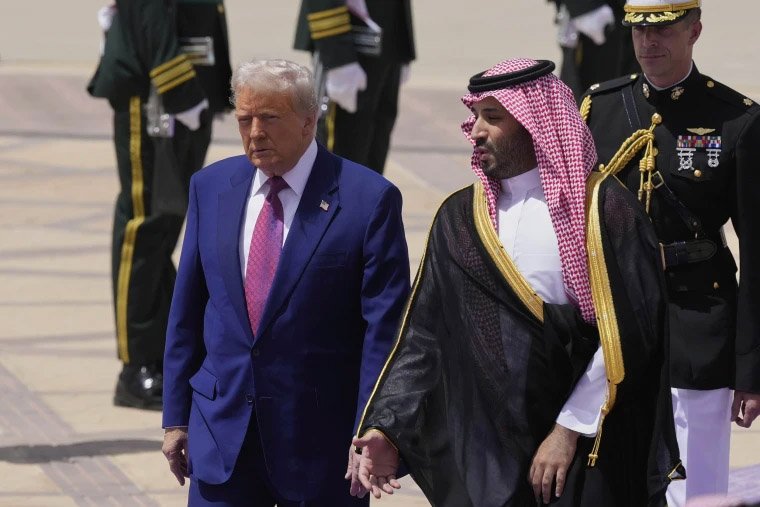
Donald Trump and Mohammed bin Salman in King Khalid International Airport — NBCNews
Eric Trump publicly announced construction plans for Trump Tower Dubai just last month, highlighting the family’s ongoing commercial footprint in the region.
These business connections extend into the digital asset ecosystem as UAE-backed investment firm MGX recently announced it would use USD1, World Liberty Financial’s stablecoin to support a $2 billion investment in Binance, the world’s largest digital asset exchange, according to APNews.
This connection between Trump-aligned interests and major digital asset investments creates a potential avenue for market influence.
Historically, stability in the Middle East, especially among oil-rich nations, reduces global market volatility. This encourages risk appetite among investors, often leading to increased allocations to digital assets like bitcoin.
Middle East diplomacy directly affects global oil prices. Stable oil prices can lower inflation expectations and lead to interest rate cuts by the Fed. Lower rates lead to an increase in liquidity, having positive effects on bitcoin, an asset that benefits from money printing.
Related: Fed Rate Cuts Could Lead to Major Price Swings for Bitcoin
On the investment front, Abu Dhabi’s Wealth Fund, Mubadala Investment Company, has been focused on increasing their shares in BlackRock’s iShares Bitcoin Trust (IBIT).
According to a 13F filing with the U.S. Securities and Exchange Commission, Mubdala held 8.7 million IBIT shares, totaling $408.5 million as of March 31, 2025.
The Abu Dhabi Wealth Fund increased its shares by 500,000 since its last filing in December of 2024.
Back in March, the United States created a Strategic Bitcoin Reserve. The executive order states that the U.S. will not sell the bitcoin they already hold, and will create budget-neutral ways to increase their holdings.
The time has come where governments and wealth funds alike are jumping on board the Bitcoin train.
Trump’s recent visit to the Middle East illustrates how financial, diplomatic, and personal interests are becoming increasingly intertwined with Bitcoin and digital assets, serving as a new axis of influence in the U.S.-Middle East relations.
The combination of diplomatic progress and business expansion has heightened short-term volatility and trading volumes in the bitcoin market.
Trump’s business and digital asset ties in the region may further boost institutional interest and create an opportunity for more players to enter the market.
-
 @ 9ca447d2:fbf5a36d
2025-05-23 07:01:50
@ 9ca447d2:fbf5a36d
2025-05-23 07:01:50Bahrain-based Al Abraaj Restaurants Group has made history by becoming the first publicly-traded company in the Middle East to add bitcoin to its corporate treasury. This is a major step forward for regional bitcoin adoption.
On May 15, 2025, Al Abraaj Restaurants Group, a well-known restaurant chain listed on the Bahrain Bourse, announced it had bought 5 bitcoin (BTC) as part of a new treasury strategy. This makes the company the first in Bahrain, the GCC and the Middle East to officially hold bitcoin as a reserve asset.
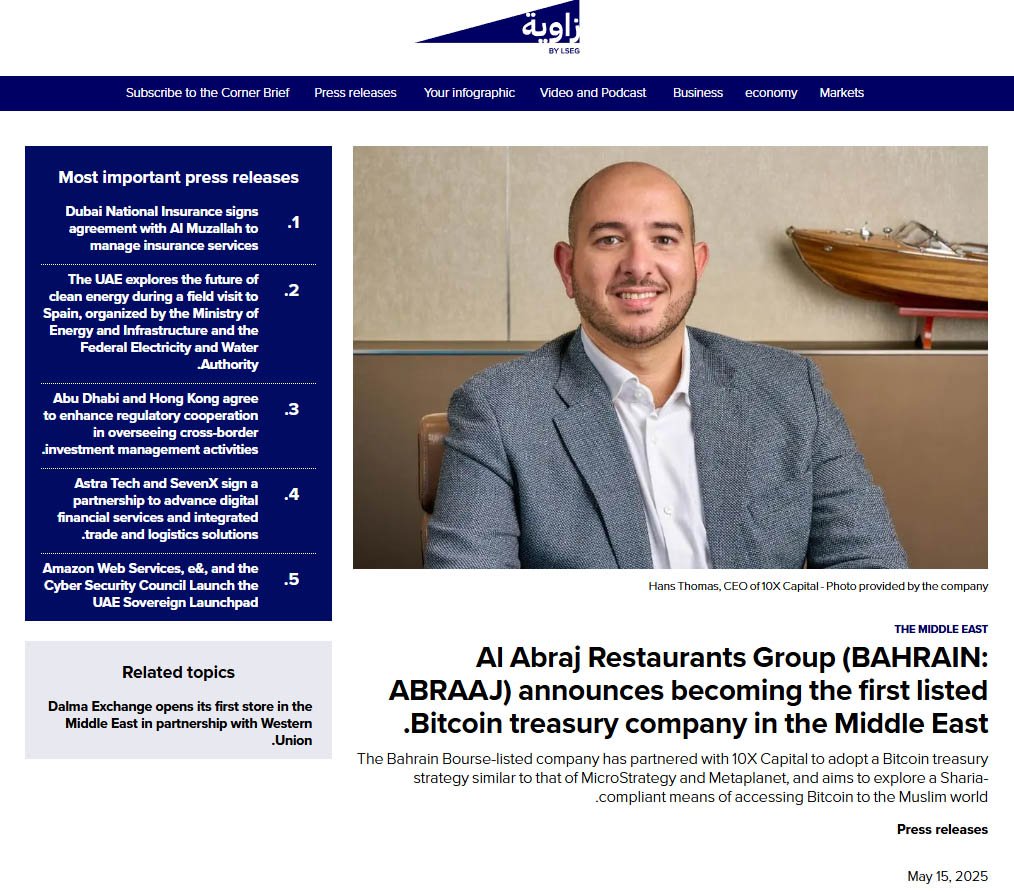
Al Abraaj adds bitcoin to its treasury — Zawya
This is a growing trend globally where companies are treating bitcoin not just as an investment but as a long-term store of value. Major companies like Strategy, Tesla and Metaplanet have already done this — and now Al Abraaj is following suit.
Metaplanet recently added 1,241 BTC to its treasury, boosting the company’s holdings above El Salvador’s.
Related: Metaplanet Overtakes El Salvador in Bitcoin Holdings After $126M Purchase
“Our initiative towards becoming a Bitcoin Treasury Company reflects our forward-thinking approach and dedication to maximizing shareholder value,” said Abdulla Isa, Chairman of the Bitcoin Treasury Committee at Al Abraaj.
Al Abraaj’s move is largely inspired by Michael Saylor, Executive Chairman of Strategy, the world’s largest corporate holder of bitcoin. Saylor’s strategy of allocating billions to bitcoin has set a model that other companies — now including Al Abraaj — are following.
A photo shared by the company even showed a meeting between an Al Abraaj representative and Saylor, with the company calling itself the “MicroStrategy of the Middle East”.
“We believe that Bitcoin will play a pivotal role in the future of finance, and we are excited to be at the forefront of this transformation in the Kingdom of Bahrain,” Isa added.
To support its bitcoin initiative, Al Abraaj has partnered with 10X Capital, a New York-based investment firm that specializes in digital assets.
10X Capital has a strong track record in bitcoin treasury strategies, and recently advised Nakamoto Holdings on a $710 million deal — the largest of its kind.
With 10X’s help, Al Abraaj looks to raise more capital and increase its bitcoin holdings over time to maximize bitcoin-per-share for its investors. The company will also develop Sharia-compliant financial instruments so Islamic investors can get exposure to bitcoin in a halal way.
“Bahrain continues to be a leader in the Middle East in Bitcoin adoption,” said Hans Thomas, CEO of 10X Capital. He noted, with a combined GDP of $2.2 trillion and over $6 trillion in sovereign wealth, the GCC now has its first publicly listed bitcoin treasury company.
This is not just a first for Al Abraaj — it’s a first for the region. Bahrain has been positioning itself as a fintech hub and Al Abraaj’s move will encourage more non-fintech companies in the region to look into bitcoin.
The company said the decision was made after thorough due diligence and is in line with the regulations set by the Central Bank of Bahrain (CBB). Al Abraaj will be fully compliant with all digital asset transaction rules, including transparency, security and governance.
A special Bitcoin Committee has been formed to oversee the treasury strategy. It includes experienced bitcoin investors, financial experts and portfolio managers who will manage risk, monitor market conditions and ensure best practices in custody and disclosure.
The initial purchase was 5 BTC, but Al Abraaj sees this as just the beginning. The company stated that there are plans in motion to allocate a significant portion of their treasury into bitcoin over time.
According to the company’s reports, Al Abraaj is financially sound with $12.5 million in EBITDA in 2024. This strong financial foundation gives the company the confidence to explore new strategies like bitcoin investment.
-
 @ 9ca447d2:fbf5a36d
2025-05-23 07:01:49
@ 9ca447d2:fbf5a36d
2025-05-23 07:01:49Steak ‘n Shake recently made headlines by officially accepting bitcoin payments via the Lightning Network across all its U.S. locations. The integration of Bitcoin payments at over 500 locations is a monumental moment for both the fast food industry and the broader retail sector.
This is not just something that Steak ‘n Shake is testing in a handful of locations, they are doing a full-scale rollout, fully embracing Bitcoin.
With more than 100 million customers a year, Steak ‘n Shake’s integration of Lightning—Bitcoin’s fast, low-fee payment layer—makes it easier than ever to use Bitcoin in day-to-day life. Buying a burger and a shake with sats? That’s now a real option.
The process is straightforward. Customers simply scan a Lightning QR code at the register, completing their payment in seconds, while Steak ‘n Shake receives instant USD conversion, ensuring price stability and ease of use.
So what does this mean for Bitcoin and E-commerce?
For starters, Steak ‘n Shake becomes the first of eventually many to fully embrace a digital world. As Bitcoin continues to grow, consumers will continue to realize the benefits of saving in a currency that is truly scarce and decentralized.
This is a huge step forward for Bitcoin as it shows it is not just for holding, it’s for spending, too. And by using the Lightning Network, Steak n’ Shake is helping prove that Bitcoin can scale for everyday transactions.
This now creates a seamless checkout experience, making bitcoin a viable alternative to credit cards and cash.
More importantly, it signals a significant shift in mainstream attitudes towards Bitcoin. As a well-known brand across America, this move serves as a powerful endorsement, likely to influence other chains and retailers to consider similar integrations.
Related: Spar Supermarket in Switzerland Now Accepts Bitcoin Via Lightning
What can this mean for your business?
Accepting bitcoin as payment can open the door to a new demographic of tech-savvy, financially engaged consumers who prefer digital assets.
As we know, companies that adopt Bitcoin receive a fascinating amount of love from the Bitcoin community and I would assume Steak n’ Shake will be receiving the same amount of attention.
From a business perspective, accepting bitcoin has become more than just a payment method—it’s a marketing tool. It sets your business apart and gets people talking. And in a crowded market, that kind of edge matters.
Steak ‘n Shake’s embrace of Bitcoin is likely to accelerate the adoption of digital assets in both physical retail and e-commerce.
As more businesses witness the operational and marketing benefits, industry experts anticipate a ripple effect that will increase interaction between consumers and digital currencies, further regulatory clarity, and bring continued innovation in payment technology.
Steak ‘n Shake’s nationwide Bitcoin payments rollout is more than a novelty. It’s a pivotal development for digital payments, setting a precedent for other retailers and signaling the growing integration of digital assets into everyday commerce.
-
 @ 9ca447d2:fbf5a36d
2025-05-23 07:01:48
@ 9ca447d2:fbf5a36d
2025-05-23 07:01:48Panama City may be the next Latin American city to adopt bitcoin, after El Salvador.
Panama City Mayor Mayer Mizrachi has got the bitcoin world excited after hinting that the city might have a bitcoin reserve. The speculation started on May 16 when Mizrachi posted a simple but powerful message on X:
Two words. That’s it. What makes it special is that it came after a high-profile meeting with Max Keiser and Stacy Herbert, two key figures behind El Salvador’s bitcoin strategy.
Keiser is an advisor to El Salvador’s President Nayib Bukele and Herbert leads the country’s Bitcoin Office.
El Salvador became the first country to adopt bitcoin as legal tender back in 2021. Since then, it has been building a national bitcoin reserve, currently holding 6,179 BTC worth around $640 million. It’s also using geothermal energy to power bitcoin mining in an eco-friendly way.
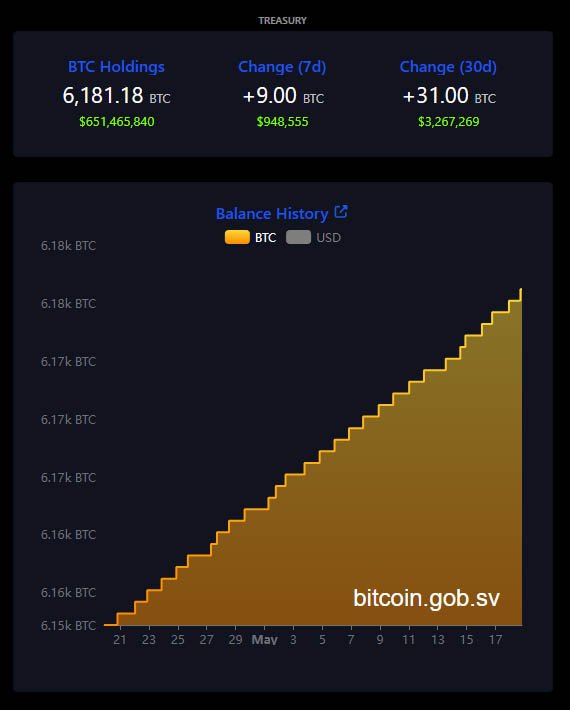
El Salvador’s bitcoin treasury — Bitcoin.gob.sv
Mizrachi’s meeting with Keiser and Herbert was about how Panama could do the same. While the details of the conversation are private, Keiser shared on social media that the two countries will play a big role in the future of Bitcoin.
“Bitcoin is transforming Central America,” Keiser wrote. “El Salvador’s geothermal & Panama’s hydro-electric will power the Bitcoin revolution.”
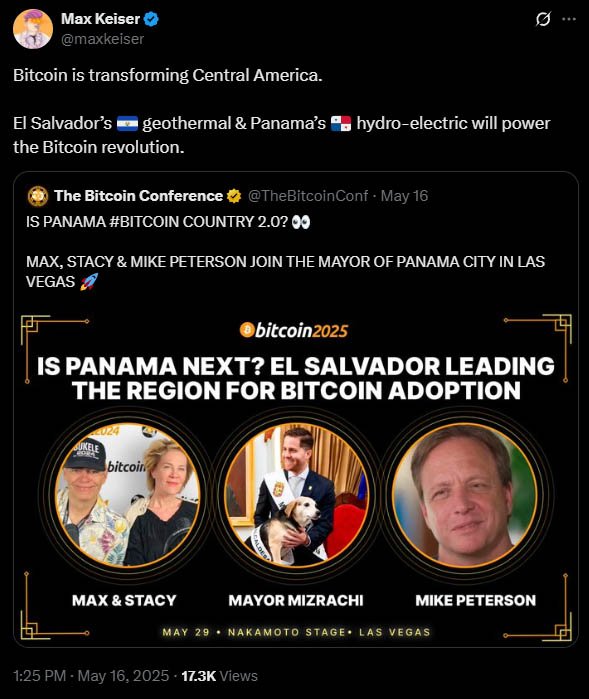
Max Keiser on X
Panama with its hydroelectric power could be a hub for green bitcoin mining.
Mizrachi has not announced a bitcoin reserve plan nor submitted a proposal to the National Assembly. But his post and public appearances suggest it’s being considered.
He will be speaking at the upcoming Bitcoin 2025 Conference in Las Vegas just days after his social media post. Many expect he will share more about Panama City’s bitcoin plans during his talk.
If Mizrachi pushes for a bitcoin reserve, he will need to work with national lawmakers to pass new legislation. So far, there is no evidence of that.
Even without a bitcoin reserve, Panama City is already going big on digital assets.
In April 2025, the city council approved a measure to allow residents to pay taxes, fees, fines and permits with digital currencies. Supported tokens are bitcoin (BTC), ethereum (ETH), USD Coin (USDC) and Tether (USDT).
To comply with financial laws, the city has partnered with a bank that instantly converts these digital assets into U.S. dollars. According to Mizrachi, this way it’s easier for residents to use digital assets and the city’s financial operations will be transparent and legal.
Another part of the meeting with El Salvador’s advisors was education.
Stacy Herbert confirmed that Panama City will be integrating El Salvador’s financial literacy book, “What is Money?” into their digital library system. The goal is to help students, teachers and the general public understand bitcoin and digital currencies in modern finance.
This is a trend in Latin America where countries are looking for alternatives to traditional banking systems. Inflation, economic instability and the rise of decentralized finance are forcing governments to look into new financial tools.
-
 @ 9ca447d2:fbf5a36d
2025-05-23 07:01:47
@ 9ca447d2:fbf5a36d
2025-05-23 07:01:47Ed Suman, a 67-year-old retired artist who helped create large sculptures like Jeff Koons’ Balloon Dog, reportedly lost his entire life savings — over $2M in digital assets — in a sophisticated scam.
The incident is believed to be tied to the major data breach at Coinbase, one of the world’s largest digital asset exchanges.
Suman’s story is part of a bigger wave of attacks on digital asset holders using stolen personal info, and has triggered lawsuits, regulatory concerns and questions about digital security in the Bitcoin space.
In March 2025, Suman got a text message about suspicious activity on his Coinbase account. After Suman reported he was unaware of any unauthorized activity regarding his account, he got a call from a man who introduced himself as Brett Miller from Coinbase Security.
The guy sounded legit — he knew Suman’s setup, including that he used a Trezor Model One hardware wallet, a device meant to keep bitcoin and other digital assets offline and safe.
Suman told Bloomberg the guy knew everything, including the exact amount of digital assets he had.
The attacker persuaded Suman that his Trezor One hardware wallet and its funds were at risk and walked him through a “security procedure” that involved entering his seed phrase into a website that looked exactly like Coinbase, in order to “link his wallet to Coinbase”.
Nine days later, another guy called and repeated the process, saying the first one didn’t work.
And then, all of Suman’s digital assets — 17.5 bitcoin and 225 ether — were gone. At the time, bitcoin was around $103,000 and ether around $2,500, so the stolen stash was worth over $2 million.
Suman turned to digital assets after retiring from a decades-long art career. He stored his assets in cold storage to avoid the risks of online exchanges. He thought he did everything right.
Suman’s attackers didn’t pick his name out of a hat.
It looks like his personal info may have been leaked in the major breach at Coinbase. The company confirmed on May 15 that some of its customer service reps in India were bribed to access internal systems and steal customer data.
The stolen data included names, phone numbers, email addresses, balances and partial Social Security numbers.
According to Coinbase’s filing with the U.S. Securities and Exchange Commission, the breach may have started as early as January and affected nearly 1% of the company’s active monthly users — tens of thousands of people.
Hackers demanded $20M from Coinbase to keep the breach quiet but the company refused to pay. Coinbase says it fired the compromised agents and is setting aside $180M to $400M to reimburse affected users.
But so far, Suman hasn’t been told if he’ll be reimbursed.
Since the breach was disclosed, Coinbase has been hit with at least six lawsuits.
The lawsuits claim the company failed to protect user data and handled the aftermath poorly. One lawsuit filed in New York federal court on May 16 says Coinbase’s response was “inadequate, fragmented, and delayed.”
“Users were not promptly or fully informed of the compromise,” the complaint states, “and Coinbase did not immediately take meaningful steps to mitigate further harm.”
Some lawsuits are seeking damages, others are asking Coinbase to purge user data and improve its security. Coinbase has not commented on the lawsuits but pointed reporters to a blog post about its response.
Suman’s case is a cautionary tale across the Bitcoin world. He used a hardware wallet (considered the gold standard of Bitcoin security) and was still tricked through social engineering. Even the strongest security is useless if you don’t understand how Bitcoin works.
It’s never too early for Bitcoiners to start learning more about Bitcoin, especially on how to keep their stash safe. And the first lesson is “never ever share your seed phrase with anyone”.
Related: Bitcoin Hardware Wallet Hacks: What You Need to Know
-
 @ 9ca447d2:fbf5a36d
2025-05-23 07:01:46
@ 9ca447d2:fbf5a36d
2025-05-23 07:01:46JPMorgan Chase, the biggest bank in the U.S., is now allowing its clients to buy bitcoin — a big change of heart for an institution whose CEO, Jamie Dimon, has been a long-time critic of the scarce digital asset.
Dimon made the announcement on the bank’s investor day, which came as a shift in JPMorgan’s approach to digital assets. “We are going to allow you to buy it,” he said. “We’re not going to custody it. We’re going to put it in statements for clients.”
That means clients can buy BTC through JPMorgan but the bank won’t hold or store the digital asset. Instead it will provide access and include the BTC purchases in client statements.
According to multiple reports and posts, JPMorgan has been blocking transactions from digital asset exchanges, with several people complaining about their experience on social media.
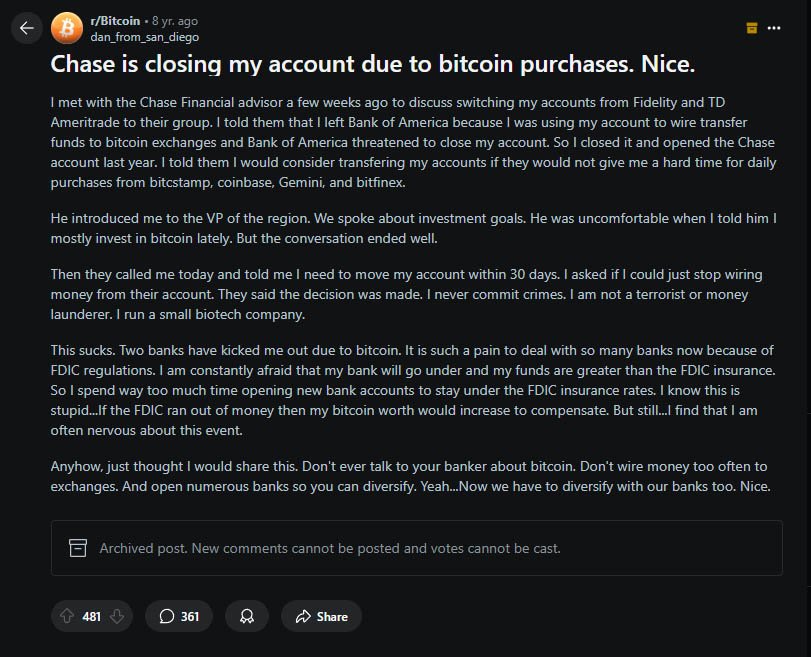
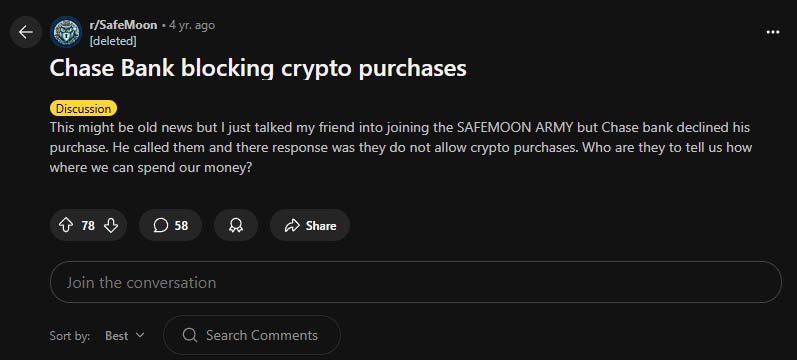
There is even an official notice on the company’s UK website that explicitly says customers cannot use their funds to purchase digital assets.
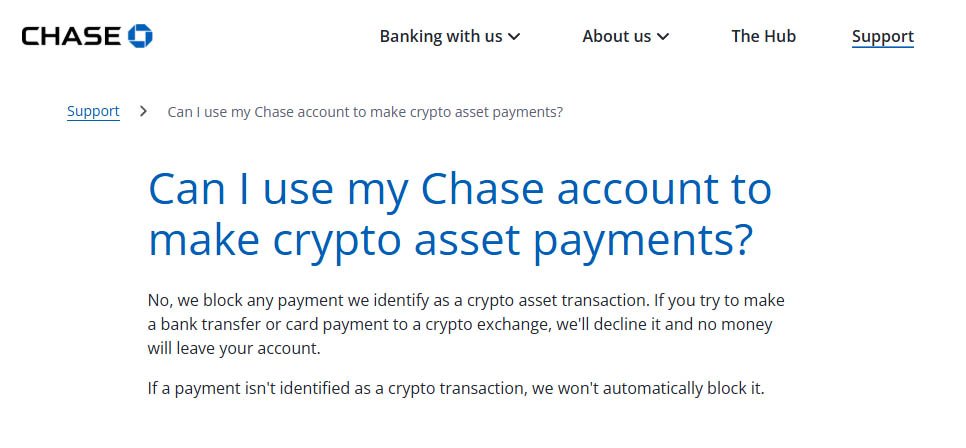
JPMorgan Chase UK website — Source
It’s a big change because Dimon has been one of Bitcoin’s biggest critics. Over the years he’s called it “worthless”, a “fraud” and even compared it to a “pet rock”.
He’s repeatedly expressed concern over digital assets’ use in illegal activities such as money laundering, terrorism, sex trafficking and tax evasion. A role that his critics say the U.S. dollar is playing on a much larger scale.
Related: Jamie Dimon Would “Close Down” Bitcoin If He Had Government Role
“The only true use case for it is criminals, drug traffickers … money laundering, tax avoidance,” he told lawmakers during a Senate hearing in 2023. At the 2024 World Economic Forum in Davos, he doubled down, “Bitcoin does nothing. I call it the pet rock.”
Despite his personal views, Dimon says the bank is responding to client demand. “I don’t think you should smoke, but I defend your right to smoke,” he said. “I defend your right to buy bitcoin.”
It’s worth noting JPMorgan isn’t fully embracing digital assets. The bank won’t be offering direct custody services or launching its own exchange.
Instead, it’s offering access to digital asset exchanges. There are even reports that the bank also plans to facilitate access to bitcoin ETFs and possibly other investment vehicles. Until recently, JPMorgan had limited its bitcoin exposure to futures-based products.
Other big financial firms have already taken similar steps.
Morgan Stanley, for example, has been offering some clients access to bitcoin ETFs since August 2024. Its CEO, Ted Pick, said earlier this year that the firm is working closely with regulators to explore ways to get into the digital assets space.
Dimon does like blockchain, though — the technology that underpins it. JPMorgan has its own blockchain projects including JPM Coin and recently ran a test transaction on a public blockchain of tokenized U.S. Treasuries.
Many criticize this view, saying that the most powerful aspect of Bitcoin is its decentralization. So, a centralized blockchain is just useless. This might be the reason Dimon has grown weary of all JPMorgan’s blockchain initiatives, because they offered nothing of value.
He said he might have given blockchain too much credit during his investor day comments: “We have been talking about blockchain for 12 to 15 years,” he said. “We spend too much on it. It doesn’t matter as much as you all think.”
-
 @ 9ca447d2:fbf5a36d
2025-05-23 07:01:44
@ 9ca447d2:fbf5a36d
2025-05-23 07:01:44Blackstone, the world’s largest alternative asset manager, has entered the Bitcoin space with a $1.08 million investment in BlackRock’s Bitcoin ETF. This is a big deal for both Wall Street and the Bitcoin world.
Blackstone has made its first direct investment in bitcoin through regulated financial products. A May 20, 2025, SEC filing revealed that the firm purchased 23,094 shares of the iShares Bitcoin Trust (IBIT), BlackRock’s spot Bitcoin exchange-traded fund (ETF).
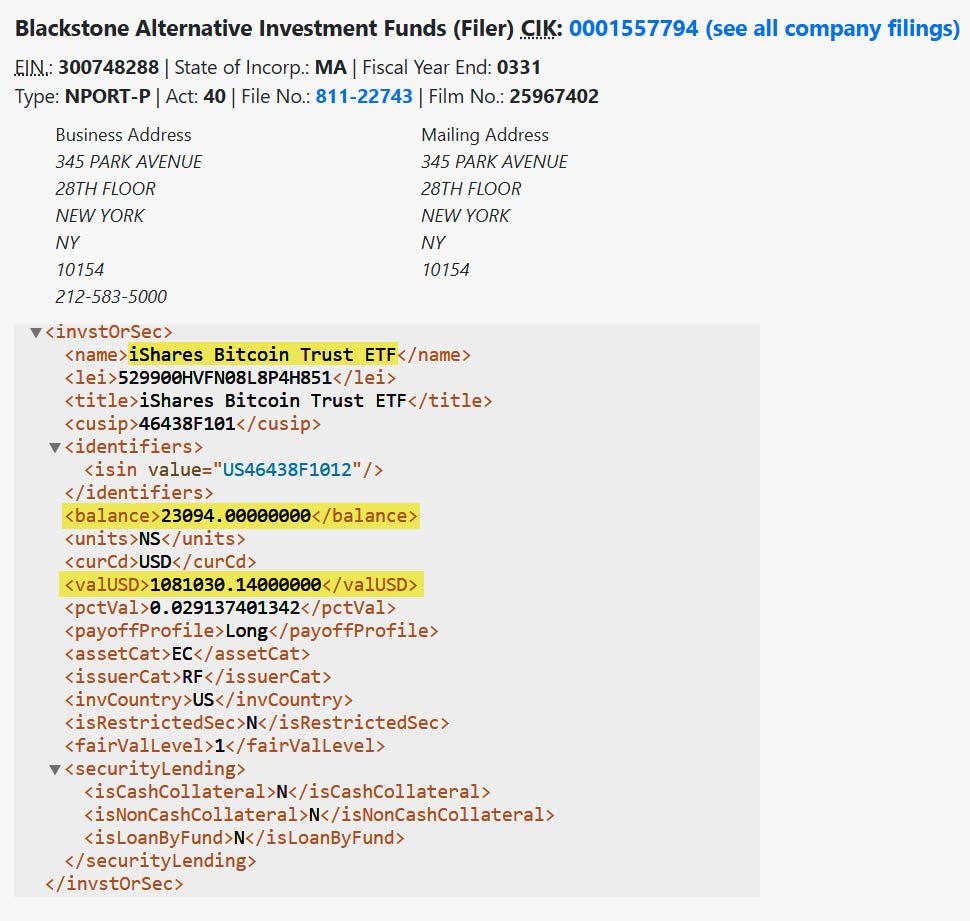
BlackStone has bought 23,094 shares of BlackRock’s IBIT — SEC
While $1.08 million is a small drop in the bucket compared to Blackstone’s $1.2 trillion in assets under management, this is a big deal for the private equity giant which has been skeptical of bitcoin in the past.
In 2019, the company’s CEO, Steve Schwarzman, said he didn’t understand Bitcoin. “I was raised in a world where someone needs to control currencies,” he said, admitting he struggled to understand the technology.
Fast forward to 2025, and it is now one of the many institutional investors taking bitcoin seriously — but doing so through cautious, regulated channels.
The investment was made through Blackstone’s $2.63 billion Alternative Multi-Strategy Fund (BTMIX), which invests in a wide range of financial instruments.
Instead of buying bitcoin directly, Blackstone chose to get exposure through a bitcoin ETF — which is how many large institutions are approaching the digital asset. Spot Bitcoin ETFs like IBIT allow investors to track the price of bitcoin without having to hold the digital asset itself.
There are several advantages to this approach. ETFs trade like stocks, are regulated by the SEC and take care of complex issues like custody and compliance. This makes them more attractive for firms that are new to Bitcoin or still wary of the risks.
Related: Bitcoin ETFs Provide Convenient Price Exposure, But At What Cost?
Blackstone’s choice of a bitcoin ETF shows how effective these products are at connecting traditional finance to the digital age.
In addition to IBIT, Blackstone also disclosed smaller investments in two other digital-asset-related companies:
- 9,889 shares of the ProShares Bitcoin Strategy ETF (BITO), valued at about $181,166.
- 4,300 shares of Bitcoin Depot Inc. (BTM), a bitcoin ATM operator, worth approximately $6,300.
Together, these are a tiny fraction of Blackstone’s portfolio but show growing interest and exploration into the space.
Since its launch in January 2024, BlackRock’s IBIT ETF has become the top-performing Bitcoin ETF in the U.S. As of mid-May 2025, the fund has seen over $46.1 billion in net inflows with no outflows since early April.
IBIT is ahead of other major ETFs like Fidelity’s FBTC and ARK’s 21Shares Bitcoin ETF.
But the trend is clear: big firms are getting comfortable with regulated bitcoin products. Industry insiders see Blackstone’s move as part of a broader shift in institutional sentiment towards bitcoin.
This is a small investment but it matters because of who is making it. Blackstone is known for being conservative and risk-averse.
Its decision to put even a tiny amount of capital into Bitcoin ETFs means tradfi companies are getting more confident in bitcoin as an asset class. Blackstone is dipping its toe in the water, and even a small step is significant given its size and influence.